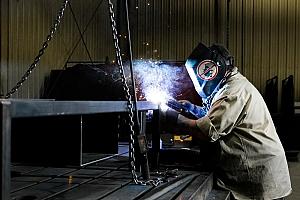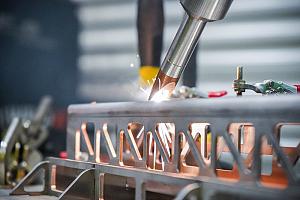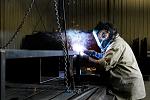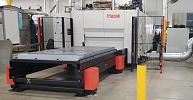- FMA
- The Fabricator
- FABTECH
- Canadian Metalworking
Categories
- Additive Manufacturing
- Aluminum Welding
- Arc Welding
- Assembly and Joining
- Automation and Robotics
- Bending and Forming
- Consumables
- Cutting and Weld Prep
- Electric Vehicles
- En Español
- Finishing
- Hydroforming
- Laser Cutting
- Laser Welding
- Machining
- Manufacturing Software
- Materials Handling
- Metals/Materials
- Oxyfuel Cutting
- Plasma Cutting
- Power Tools
- Punching and Other Holemaking
- Roll Forming
- Safety
- Sawing
- Shearing
- Shop Management
- Testing and Measuring
- Tube and Pipe Fabrication
- Tube and Pipe Production
- Waterjet Cutting
Industry Directory
Webcasts
Podcasts
FAB 40
Advertise
Subscribe
Account Login
Search
From the Web: Fabricators in the limelight; high cost of a tiny, missing part; automakers and art
- By Vicki Bell
- June 11, 2014
New Jersey-based EVS Metal recently shared the news that the company madeThe FABRICATOR®’s Top 40, a ranking of the most successful fabricating companies in North America. Boasting revenue of $30.1 million in 2013, EVS Metal claimed the No. 15 spot on the list.
The company said the magazine predicts that it will continue to grow during the current year, citing a $3.7 million growth in revenue by the end of 2014. With an approximate 12 percent growth index, the company is poised to break into the top 10 within a few years’ time.
You’ll find all of the Top 40 companies listed here.
While General Motors continues to work on an estimate of the financial fallout from the ignition switch-prompted recall, Caterpillar knows just how much a lawsuit brought by the now-defunct Bender Shipbuilding and Repair has cost—a $46 million settlement and likely, any legal fees.
The lawsuit stemmed from an explosion and fire caused by a defective 3516B Caterpillar engine onboard the M/V Sherman, a ship that was under construction at the time.
Discovery in the suit revealed that the engine failure was caused by a missing oil plug, a part about the size of a nickel that had been left out of the crankshaft in the innermost part of the engine when it was manufactured.
The 2008 fire burned for almost 24 hours. It took far longer to find its cause, which involved examining the severely damaged 17,000-lb. engine—about the size of a commercial truck—with thousands of parts. But find it, they did. Every part of a product is important, no matter its size.
While GM doesn’t know the costs of its recall, it apparently does have some money to spare.
Hoping to avoid being ordered to sell the Detroit Institute of Arts’ collection because of the city’s bankruptcy, the city, state, and other groups are attempting to raise $800 million as part of a so-called “grand bargain” that would pay creditors part of what they are owed and help protect pension benefits for retired city employees. If the bargain is successful, the art would be moved into a nonprofit trust.
Responsible for raising $100 million of the $800 million itself, the Institute has reached out to Ford, GM, and Chrysler for contributions. It originally asked the three automakers to contribute $25 million each, but Ford and GM are kicking in $10 million each, and Chrysler, $6 million. Both GM and Chrysler should understand asking for bailout money.
Let’s talk jobs, a topic that’s always in the news and one that remains a paramount concern for many, especially men. A cnn.com headline from last week read “Men still lag behind in U.S. jobs recovery.”
Noting that the recovery hit a key milestone in May as the U.S. economy finally recouped all 8.7 million jobs lost in the financial crisis, the article pointed out that not everyone has benefited equally. “Men still lag behind women. Overall, men have 699,000 fewer jobs now than they did in December 2007 when the recession began.
”Women, on the other hand recovered all their lost jobs last year.”
I appears that men were hit harder in the recession than women; the jobs that are returning are not the same jobs that were lost; and male-dominated industries like construction and manufacturing, which accounted for about half of all jobs lost, have been slow to return.
What’s growing are education and nursing jobs, traditional bastions of female employment, which raises the question: Will more men start transitioning into these fields?
“‘The number of men moving into traditional female dominated fields is a trickle rather than a surge,’ said Ariane Hegewisch, a study director at the Institute for Women’s Policy Research. ‘We do not know whether there will be a tipping point at some stage.’”.
Finally, more women are making inroads in a formerly male-dominated stronghold—manufacturing. Take Jennifer Bass, for example. After acquiring an engineering degree and an MBA, Bass worked for several manufacturers and then decided to branch out on her own. She bought Alpharetta, Ga.-based Essve Tech, a manufacturer of corrugated steel pipe, in 2004 and the business has grown significantly since she came on board.
Bass wants other women to know that the manufacturing industry isn’t like it was 10 years ago. “It’s less about brute force and getting your hands dirty and more about use of advanced technology and design. This has really leveled the playing field.
subscribe now

The Fabricator is North America's leading magazine for the metal forming and fabricating industry. The magazine delivers the news, technical articles, and case histories that enable fabricators to do their jobs more efficiently. The Fabricator has served the industry since 1970.
start your free subscriptionAbout the Author

Vicki Bell
2135 Point Blvd
Elgin, IL 60123
815-227-8209
- Stay connected from anywhere

Easily access valuable industry resources now with full access to the digital edition of The Fabricator.

Easily access valuable industry resources now with full access to the digital edition of The Welder.

Easily access valuable industry resources now with full access to the digital edition of The Tube and Pipe Journal.
- Podcasting
- Podcast:
- The Fabricator Podcast
- Published:
- 04/30/2024
- Running Time:
- 53:00
Seth Feldman of Iowa-based Wertzbaugher Services joins The Fabricator Podcast to offer his take as a Gen Zer...
- Industry Events
Pipe and Tube Conference
- May 21 - 22, 2024
- Omaha, NE
World-Class Roll Forming Workshop
- June 5 - 6, 2024
- Louisville, KY
Advanced Laser Application Workshop
- June 25 - 27, 2024
- Novi, MI
Precision Press Brake Certificate Course
- July 31 - August 1, 2024
- Elgin,
































